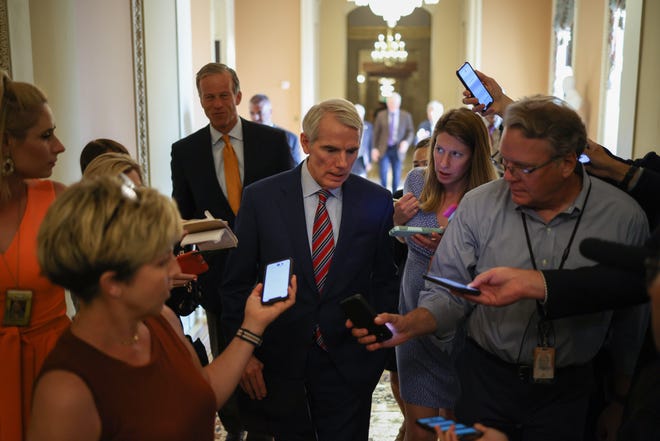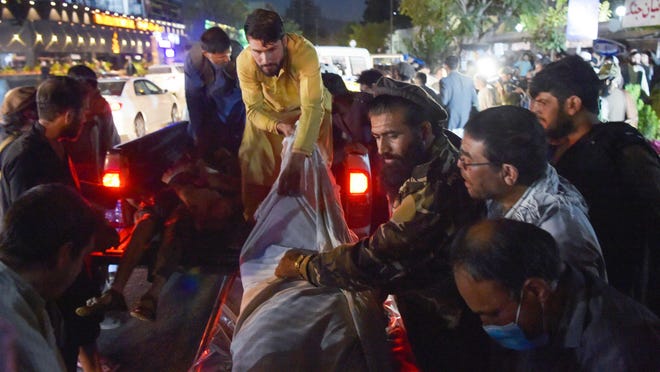
WASHINGTON – Key Senate Republicans negotiating bipartisan infrastructure legislation are warning that a vote scheduled Wednesday to begin debating the measure could fail because talks are continuing and there is no final text to the bill.
“We can’t support cloture for something we haven’t accomplished yet,” said Sen. Rob Portman of Ohio, the lead negotiator for Republicans. “We haven’t come to agreement on key issues.”
Other GOP negotiators said their colleagues won't support the vote without legislative text. The 50 Democrats need at least 10 Republicans to support the bill to clear a parliamentary hurdle for debate.
Sen. Mitt Romney, R-Utah, who has participated in negotiations, said he hoped Schumer would move the vote to begin debate to Monday. He said three-quarters of the disputed issues had been resolved in the last two days.
"I would expect that by the end of the week we'll have them all resolved," Romney said.
'Human infrastructure':Senate Democrats reach $3.5 trillion deal for Biden's 'human infrastructure' agenda, Medicare expansion
“I hope we won't have a motion to proceed on Wednesday,” said another negotiator, Sen. Susan Collins, R-Maine. “I hope it will be put off.”

The Senate vote will be a key test of whether any of President Joe Biden's ambitious and expensive economic proposals will become law. The bipartisan package offers hundreds of billions of dollars for roads, bridges, railways and broadband.
Informal talks could continue if the Senate votes Wednesday against debating it on the floor. But because of the crush of other legislation dealing with routine spending, voting rights and a policing overhaul, a Senate rejection of infrastructure could thwart one of the most auspicious prospects for bipartisan cooperation this year.
Senate Majority Leader Chuck Schumer, D-N.Y., set the vote after a month of bipartisan talks because other legislation is crowding the schedule. But he said the bill could still be debated for 30 hours and amended on the floor.
“It is not a deadline to determine every final detail of the bill,” he said.
What is reconciliation?:What is 'reconciliation,' and why is it holding up the infrastructure package?

The most contentious aspects of negotiations involve how to pay for the legislation at a time of outsized spending during the COVID-19 pandemic. One option was to boost IRS enforcement of tax collections, but that hasn't been resolved.
Congress has already approved $3.3 trillion in response to the coronavirus pandemic during the Trump administration last year and another $1.9 trillion under Biden in March. Biden's spending proposals led to comparisons to the New Deal under former President Franklin Delano Roosevelt.
Republicans led by Senate Minority Leader Mitch McConnell of Kentucky have insisted on having legislative text before voting on the bipartisan bill.
"It really is a parody," said Sen. John Cornyn, R-Texas. "If my constituents think I was voting on a bill that hadn't been written yet, and I didn't know how much it would cost, they would probably try to recall me."
But Democrats contend repairing and expanding crumbling infrastructure is too important to postpone. Democratic negotiators described working late into the night to resolve dozens of disputes – talks that have not yet concluded.
"I feel better today than I did last night," said Sen. Mark Warner, D-Va., after negotiations ran Monday until midnight.
Sen. Jon Tester, D-Mont., told reporters Monday that Republicans opposing the debate for lack of legislative text would be "a problem." But he said Schumer's strategy to force a vote is common and shouldn't kill the bill.
"Hopefully, people will be smarter than that," Tester said.
If senators agree to begin discussing the legislation, they would have 30 hours to debate and amend the bill. But Schumer said if no consensus is reached on the legislation Thursday, he would begin adding other legislation through four major amendments.
The four additional pieces of legislation, which were each approved in committee in bipartisan votes, include a water-projects bill, a highway bill, a railway bill and an energy bill.
"I understand that both sides are working very hard to turn the bipartisan infrastructure framework into final legislation, and they will continue to have more time to debate, amend, and perfect the bill once the Senate votes to take up this crucial issue,” Schumer said. “But they have been working on this bipartisan framework for more than a month already and it’s time to begin the debate.”

The debate only becomes more rancorous over $3.5 trillion legislation that Schumer said the Senate will consider during the July work period, which he warned might extend into August.
Senate Democrats have proposed to spend that money on Biden’s economic priorities dealing with caregivers and education. Republicans contend Democrats are spending irresponsibly, particularly with inflation growing.
“There is no reason we can’t get the ball rolling this week on both elements of the Senate’s infrastructure agenda,” Schumer said.
The $3.5 trillion package is much more contentious because Democrats are pursuing a strategy for approving it potentially without any Republican votes using a legislative maneuver called reconciliation.
The package that Senate Democrats negotiated with the White House would include Biden priorities such as a Medicare expansion to cover dental, vision and hearing benefits; child care subsidies; home health care development programs and two years of federally subsidized community college.
Senate Budget Chairman Bernie Sanders, I-Vt., aims to move the legislation under reconciliation, which would allow a simple majority of the 100-member Senate to approve it, rather than needing to clear a 60-vote hurdle to avoid a Republican filibuster. Democrats and Republicans each have 50 votes, with Vice President Kamala Harris holding the tie-breaking vote.
Midterms 2022 fundraising:Liz Cheney got a fundraising boost, but Trump-friendly Republicans raised big money too
But even some Democrats in the evenly divided Senate are asking for details before committing to support it.
“That's a challenge,” Sen. Joe Manchin, D-W.Va., a key swing vote, told reporters Thursday. “I’ll take a challenge. I’ll work as hard as I can.”
Source link








